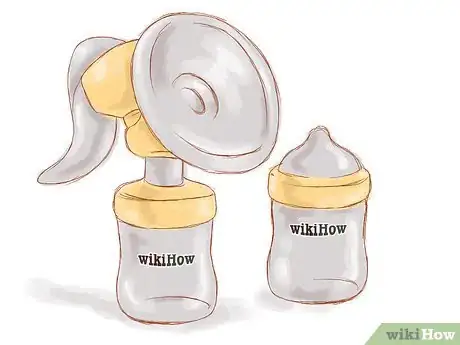This article was co-authored by Rebecca Nguyen, MA. Rebecca Nguyen is a Certified Lactation Consultant and Childbirth Educator. She runs Family Picnic in Chicago, Illinois with her mother Sue Gottschall, where they teach new parents about childbirth, breastfeeding and child development and education. Rebecca taught preschool through 3rd grade for 10 years, and she received her Master’s Degree in Early Childhood Education from the University of Illinois in 2003.
There are 12 references cited in this article, which can be found at the bottom of the page.
wikiHow marks an article as reader-approved once it receives enough positive feedback. This article received 19 testimonials and 100% of readers who voted found it helpful, earning it our reader-approved status.
This article has been viewed 1,586,931 times.
Many mothers fear they are not producing enough breast milk to satisfy their baby. In most cases, the fear is based on false alarms, such as shorter nursing times or natural appetite growth. These are natural scenarios many mothers experience when breastfeeding. If your baby, however, is not gaining weight, or worse, if he's losing weight, then increasing breast milk production can help.
Steps
Increasing Production Pre-Breastfeeding
-
1Consume a minimum of 1,800 calories a day and drink at least 6 glasses of fluids while you are lactating. The exact number of calories vary by activity level and other factors,[1] but as a general rule, your body needs 450 to 500 extra calories per day as compared to your regular diet.[2] For active women, this could mean as many as 2,500 total calories daily.Unsurprisingly, what you eat has a big impact on the quality and quantity of the milk produced. Here are some general guidelines for you to remember about diet and breast milk:[3]
- Find excellent sources of calcium. These will help your little baby's little bones grow healthy and strong. Calcium-rich foods include dairy products (opt for organic dairy products, however), leafy green vegetables, and certain fish (sardines and salmon).
- Eat fruits and vegetables. Make fruits and vegetables a big part of your diet, as they are packed with vitamins, minerals, and fiber.
- Opt for complex carbohydrates. Complex carbs are healthier than processed carbs, which you may by and large avoid. Complex carbs include such things as brown rice, whole-grain pasta and bread, as well as beans.
- Opt for lean meat. Lean meat is better than fatty cuts. Think skinless chicken breast, fish, low-fat dairy products, and soy products like tofu.
-
2Consult your doctor about using prescription or herbal supplements to increase breast milk. Herbs that work well include fenugreek, blessed thistle and red raspberry. The prescription drug metoclopramide is sometimes used as a last resort by doctors to treat low milk production in nursing mothers.Advertisement
-
3Supplement feedings with pumping. Pumping is beneficial for two reasons. First, pumping allows you to store breast milk when your baby doesn't need it, allowing you amass and store more expressed milk.[6] Second, pumping stimulates the production of more breast milk.[7]
- Invest in a high-quality pump. Pumping isn't exactly the spice of life, so it pays to invest in one that works well. You can rent a hospital-grade pump if you don't own a high-quality, double pump.
- Whether you are at work or at home, consider pumping for 15 minutes every couple of hours. Either that, or pump for 5 to 10 minutes after nursing. Pumping at least 8 times during a 24-hour period will help to quickly increase breast milk production. If you can't pump immediately after nursing, try to pump halfway in between feedings.
- Pump both breasts at the same time. Pumping both breasts will give you twice as much breast milk twice as fast in addition to helping stimulate more production.
-
4Limit the use of pacifiers and bottles while you're trying to make more breast milk. This makes sure all your baby's sucking needs are met at the breast. As the baby gets older, it will be easier for him to go back and forth from breast to pacifier without you losing important breast stimulation. If you are using bottles for supplementing, try to replace those with a syringe or spoon.[8]
Increasing Production During Breastfeeding
-
1Relax. Loads of stress can hurt your ability to produce milk. Try to relax before pumping or breastfeeding by playing soothing music, looking at pictures that produce happiness, or just having a moment with the love of your life.[9]
- If you want to, try putting warm compresses on your breasts or massaging them for a short period right before you intend to pump or breastfeed.
-
2Allow your baby to nurse frequently for as long as he wants. The more often your breasts are stimulated, the more milk your body makes. At least 8 feedings in a 24-hour period is ideal, more if possible. If you normally feed on a set schedule, allow the baby to feed on demand to increase your breast milk production.[10]
-
3Practice undressing your baby to stimulate skin-to-skin contact during breast feeding. Undressing your baby while he breast feeds may help him feed longer. (Longer sessions mean more production of breast milk.)[11]
- Undress your baby down to his diaper, but drape a blanket over his back to ensure that he doesn't get cold.
- Take off your bra and wear a shirt that can be unbuttoned on the front to promote skin-to-skin contact.
-
4Try sling feeding. Wearing a sling and keeping your baby close to the ultimate food supply should encourage him to feast more frequently. Some babies tend to feed more when on the move.
-
5Offer your baby both breasts at every feeding to let your body know to make more breast milk. Switch breasts as soon as your baby slows down. It's best if you can switch again and offer each breast twice during a single feeding session. Let your baby nurse for as long as possible-until he falls asleep or detaches.[12]
-
6Try taking a nursing "vacation."For a day or two, take your baby to bed with you and do nothing but nurse when the urge hits your baby. Of course, you get to go to the kitchen and the bathroom and hit other motherly duties, but this vacation is all about you and your newborn.[13]
- During this vacation, take advantage of nap nursing, which is exactly what it sounds: sleeping with your baby ever-close to his favorite food. This relaxes both mother and child. It also increases the stimulation of milk-producing hormones.
Expert Q&A
-
QuestionCan pumping mess up breastfeeding?
 Rebecca Nguyen, MARebecca Nguyen is a Certified Lactation Consultant and Childbirth Educator. She runs Family Picnic in Chicago, Illinois with her mother Sue Gottschall, where they teach new parents about childbirth, breastfeeding and child development and education. Rebecca taught preschool through 3rd grade for 10 years, and she received her Master’s Degree in Early Childhood Education from the University of Illinois in 2003.
Rebecca Nguyen, MARebecca Nguyen is a Certified Lactation Consultant and Childbirth Educator. She runs Family Picnic in Chicago, Illinois with her mother Sue Gottschall, where they teach new parents about childbirth, breastfeeding and child development and education. Rebecca taught preschool through 3rd grade for 10 years, and she received her Master’s Degree in Early Childhood Education from the University of Illinois in 2003.
International Board Certified Lactation Consultant No, it's good to pump while you're breastfeeding. It may even help your body make more milk.
No, it's good to pump while you're breastfeeding. It may even help your body make more milk. -
QuestionWhat herbs are good for breastfeeding?
 Rebecca Nguyen, MARebecca Nguyen is a Certified Lactation Consultant and Childbirth Educator. She runs Family Picnic in Chicago, Illinois with her mother Sue Gottschall, where they teach new parents about childbirth, breastfeeding and child development and education. Rebecca taught preschool through 3rd grade for 10 years, and she received her Master’s Degree in Early Childhood Education from the University of Illinois in 2003.
Rebecca Nguyen, MARebecca Nguyen is a Certified Lactation Consultant and Childbirth Educator. She runs Family Picnic in Chicago, Illinois with her mother Sue Gottschall, where they teach new parents about childbirth, breastfeeding and child development and education. Rebecca taught preschool through 3rd grade for 10 years, and she received her Master’s Degree in Early Childhood Education from the University of Illinois in 2003.
International Board Certified Lactation Consultant It's possible fenugreek and blessed thistle can help with breastfeeding because they may increase prolactin and oxytocin, which contribute to milk production. However, always check with your doctor before taking any herbs.
It's possible fenugreek and blessed thistle can help with breastfeeding because they may increase prolactin and oxytocin, which contribute to milk production. However, always check with your doctor before taking any herbs.
References
- ↑ https://www.nichd.nih.gov/health/topics/breastfeeding/conditioninfo/calories#f3
- ↑ https://www.acog.org/Patients/FAQs/Breastfeeding-Your-Baby
- ↑ https://www.medicalnewstoday.com/articles/322844.php
- ↑ https://www.ncbi.nlm.nih.gov/pmc/articles/PMC5158159/
- ↑ Rebecca Nguyen, MA. International Board Certified Lactation Consultant. Expert Interview. 10 June 2019.
- ↑ https://med.stanford.edu/newborns/professional-education/breastfeeding/maximizing-milk-production.html
- ↑ Rebecca Nguyen, MA. International Board Certified Lactation Consultant. Expert Interview. 10 June 2019.
- ↑ https://www.aafp.org/afp/2009/0415/p681.html
- ↑ https://childrenswi.org/newshub/stories/how-mindfulness-can-help-breastfeeding-moms
About This Article
To increase your breast milk production, allow your baby to nurse frequently for as long as they want, since stimulating your breasts more will cause your body to produce more milk. During each feeding session, offer your baby both of your breasts, which tells your body you need more milk. Looking after a newborn baby can be exhausting but try to schedule a little relaxation time for yourself every day or listen to calming music while you breastfeed, since too much stress can hinder your milk production. You should also aim to eat 450 to 500 extra calories a day while you’re breastfeeding to ensure your body has all the nutrients it needs for you and your baby. Try to drink at least 6 glasses of fluids a day too, which will keep you hydrated. For more tips from our Maternity co-author, including how to use a feeding sling to encourage your baby to drink more, read on!









































































Medical Disclaimer
The content of this article is not intended to be a substitute for professional medical advice, examination, diagnosis, or treatment. You should always contact your doctor or other qualified healthcare professional before starting, changing, or stopping any kind of health treatment.
Read More...